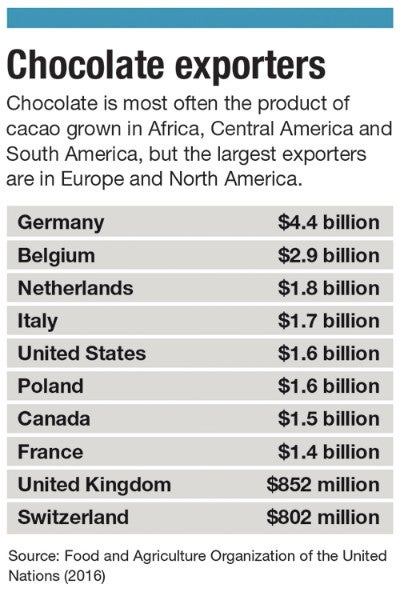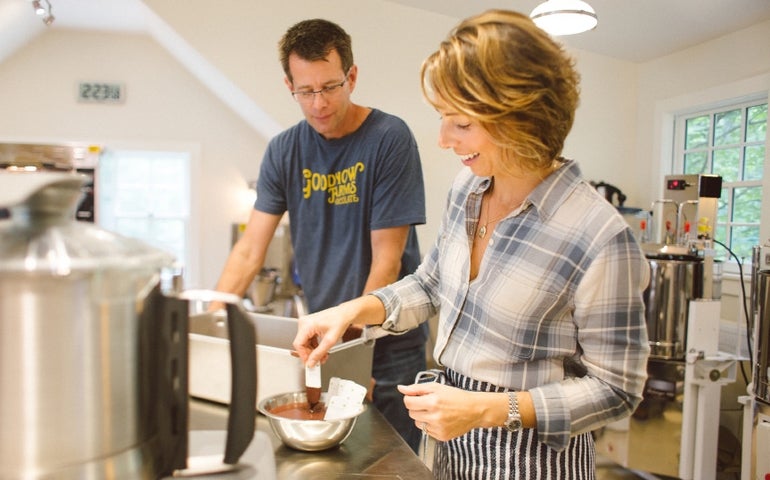Goodnow won eight awards this year by the Academy of Chocolate, and others by the International Chocolate Awards, Good Food Awards and the Northwest Chocolate Festival.
Get Instant Access to This Article
Subscribe to Worcester Business Journal and get immediate access to all of our subscriber-only content and much more.
- Critical Central Massachusetts business news updated daily.
- Immediate access to all subscriber-only content on our website.
- Bi-weekly print or digital editions of our award-winning publication.
- Special bonus issues like the WBJ Book of Lists.
- Exclusive ticket prize draws for our in-person events.
Click here to purchase a paywall bypass link for this article.
Less than a decade ago, Tom and Monica Rogan were making chocolate in their kitchen at home, just a hobby for two lovers of the sweet stuff.
Now, they and their chocolate company, Sudbury’s Goodnow Farms, are winning prestigious food awards.
If starting one’s own chocolate company might be a dream realized, the Rogans have taken it a step further.
The Rogans, who make chocolate in a commercial kitchen behind their old 1700s farmhouse, aren’t in it just for a hobby. The company’s bars are sold in 300 stores nationwide, and its chocolate-making abilities are already winning accolades.
Goodnow won eight awards this year by the Academy of Chocolate, and others by the International Chocolate Awards, Good Food Awards and the Northwest Chocolate Festival. It won six awards by the Specialty Food Association this spring, including the three best dark chocolates.
“They’re a standout brand,” said Brian Cisneros, the founder and producer of the Northwest Chocolate Festival, where Goodnow Farms won a gold and a bronze last year from among more than 300 entrants.
“The awards they’ve won are most likely just the beginning for them,” he said, calling Goodnow Farms among the best in the country.
Practice made perfect
It’s a long way from the days of experimenting while the couple lived and worked in Los Angeles, Tom in TV production and Monica in real estate.
“People told us, ‘Be prepared to throw away chocolate,’” Tom Rogan said, giving a tour of the Goodnow Farms facility. “And we threw away a lot of chocolate.”
The evolution into Goodnow Farms – named for the farm on which the Rogans’ and other houses now stand – wasn’t nearly so fast or easy.
Chocolate making was a hobby for three or four years until the Rogans decided in 2010 to sell his stake in the reality and documentary TV production company Authentic Entertainment, which won a Daytime Emmy award in 2013 for a Food Network show, “Best Thing I Ever Made,” for which he was one of four executive producers.
The Rogans moved to Massachusetts to start the business full-time.
Tom, who was born in Springfield, and Monica, who is from Baltimore, did their homework, talking today about fermentation, drying and roasting times like people who’ve been in the industry for far longer than they have. Through attending chocolate industry conferences, reasearch and word-of-mouth, they made connections to find the right cacao-growing farms in places like Guatemala, Ecuador and Peru. Then, they took one trip after another to farms to see how the process worked and who they could buy cacao beans from.
Committing themselves to paying farmers a fair wage was the next step, the Rogans negotiate directly with farmers and often pay them directly, too.
The going rate for cacao beans is around $2,000 to $2,200 a ton, Tom says. Fair-trade prices are around $2,400 a ton. Goodnow Farms pays $6,500 to $8,500.
That makes Goodnow Farms bars something to savor in small bites and not devour in one sitting, and not just because of the flavor. Goodnow Farms, which hit the market in 2016, sells 1.94-ounce bars for $10 to $16, compared to a typical Herhsey’s bar sells for $2 or less for 4.4 ounces.
The often dark stories behind those lower prices, though, have been in the spotlight since a Washington Post investigation in June of practices by Hershey’s, Nestle and Mars. The investigation alleged cruel cases of child and slave-like labor on cacao farms in Africa, with similar allegations in Malaysia.
The Post reported those chocolate companies have acknowledged being far behind on pledges to eliminate such practices in their supply. In July, two U.S. senators proposed blocking chocolate imports tied to child labor, The Post said.

Those companies whose bars are ubiquitous on grocery shelves make up a huge bulk of U.S. sales. Small players like Goodnow Farms – which makes 40,000 to 50,000 bars a year with just a few employees – can’t necessarily make a meaningful difference on the lives of cacao farm workers on their own.
“It’s not us,” Monica said. “It’s the consumers that would make the change.”
Finding a niche
For Goodnow Farms, ethical practices were a non-negotiable part of the business, but the quality and taste of the chocolate – and the awards following – have done the most to create buzz and get Goodnow Farms bars to roughly 300 retailers nationwide today, generally smaller markets, craft food stores and wine shops. The chocolate maker opened a booth at the Boston Public Market this year.
Take a look at the label on the back of a Goodnow Farms package, and there’s no impossible-to-pronounce additives.
“We’ve had to change people’s attitudes,” Monica said. “We’re not candy. We’re chocolate.”
Cisneros, from the Northwest Chocolate Festival, credited Goodnow Farms for being ambassadors for craft chocolate, having a transparent and ethical sourcing process, and even sharing techniques and recipes with others, something that’s been rare in the business.
“That’s a really good mark of character on their part,” he said.
The Rogans aren’t only chocolate purists, either.
Goodnow teamed up with the Canton craft brewer Trillium Brewing for a limited-edition chocolate stout and chocolate bar made with Trillium's imperial milk stout. Goodnow has made bars with rum and whiskey from Boston Harbor Distillery of Boston, and coffee from George Howell Coffee of Acton.
Goodnow Farms makes its own cocoa butter – a labor-intensive process requiring its own machinery – and in November will release an apple cider chocolate bar with apple cider from Honey Pot Hill Orchards in Stow, and Macoun apples from the Goodnow Farms property itself. A first milk chocolate bar is being tested.
Sourcing chocolate from so many places might not seem to matter so much to a layperson, but Tom compares it to the so-called terroir making wine or coffee in one region taste different from another to those whose pallets can tell the difference. Add in a range of different bean-roasting variations and the natural variations among coffee beans even in a cacao pod, and the variations are endless.
“That’s what makes it fun,” Tom said. “That’s what it’s all about.”

